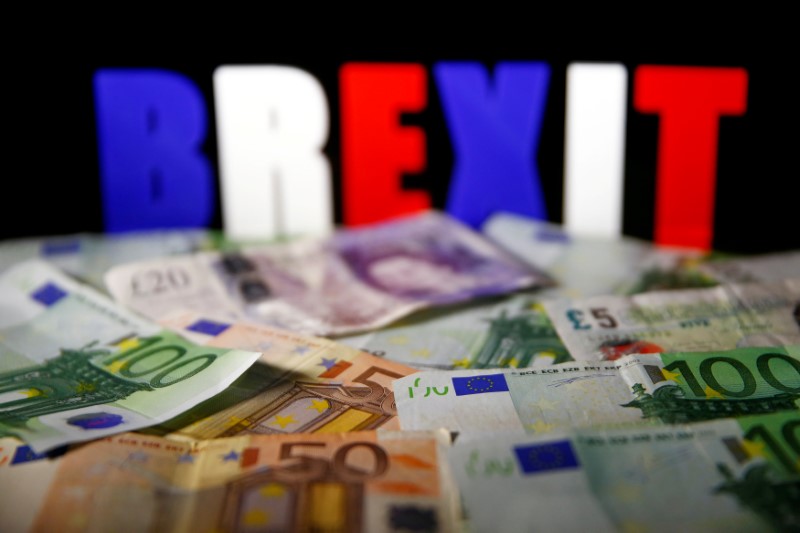By Jamie McGeever
LONDON (Reuters) - History shows British financial markets lag around election time, albeit not for long, but investors seeking parallels for next month's vote must beware of Brexit.
For decades stocks have particularly underperformed other world markets in the months following British parliamentary elections, and the 2001 and 2005 polls - which produced the kind of decisive result that markets also expect this time - may offer the best guidance.
With three weeks to go, analysis by Switzerland's UBS Wealth Management shows that the average underperformance of UK stocks against global stocks was 3.4 percent in the three months following elections held from 1970 to 2010.
Sterling and government borrowing costs also tend to drift lower in the weeks before and after general elections, although not by much and certainly nothing like the slump that followed the biggest British political shock of recent decades - the referendum vote in June last year to leave the European Union.
That's according to a Reuters analysis of the last five elections since 1997, which produced three outright victories for Labour and one for the Conservatives. In the other vote, 2010, the Conservatives emerged the biggest party but without a majority, resulting in a coalition.
Under the "New Labour" brand, Tony Blair scored wins early this century that were both convincing and unsurprising, as they had been clearly flagged in opinion polls. It appears to be a similar picture this time for the ruling Conservatives, with the only doubt in markets being the size of Prime Minister Theresa May's majority on June 8.
"This is not a tight election. It's probably going to be more like the New Labour re-elections of 2001 or 2005," said Jordan Rochester, currency strategist at Nomura.
With May promising tough policies such as removing Britain from the single European market entirely when it leaves the EU, the pound has developed some resistance to further surprises.
"Sterling has a slightly thicker skin, and 'hard Brexit' seems to be in the price somewhat," Rochester said.
In the two-month period spanning the 2001 election, sterling fell only 1.1 percent against the dollar.
Reuters analysis shows that sterling has fallen against the dollar by an average 1.3 percent over the month preceding and month following the last five elections. This was modest compared with the slump of up to 10 percent the day after the Brexit referendum.
The 10-year UK government bond (gilt) yield (GB10YT=RR) has fallen by an average just 15 basis points over the same election periods, the FTSE 100 (FTSE) index of leading shares by 2.7 percent, and the broader FTSE mid-cap 250 index by 2.5 percent (FTMC).
BREXIT UNCERTAINTY
The stand-out market-moving election of recent times was in May, 2010, resulting in Britain's first coalition government since World War Two. Sterling tumbled and stocks also fell, while a rush of safe-haven demand for gilts pushed their yields sharply lower.
But that wasn't all down to fears of political gridlock. The onset of the euro zone debt crisis that month, with Greece at its center, would unnerve investors and rattle markets around the world for several years.
Caroline Simmons, Deputy Head of the UK Investment Office at UBS Wealth Management, said that since 1970 British equities have outperformed their global peers only 33 percent of the time in the months following Conservative victories and just 25 percent after Labour wins.
As well as the 3.4 percent average underperformance in the three months following elections across those four decades, her analysis of 2015 shows that the FTSE 100 index fell 2.5 percent and the broader FTSE 250 dropped 1.2 percent. However, Britain's greater exposure to the global oil price slump - through London-listed energy groups - was also a factor.
As the months go on, investors typically find their feet when uncertainty eases, but this may not be the case now.
"Over time, things become clearer and the market tends to recover. But we've got the added outcome of Brexit this time around," Simmons said.
Investors don't like uncertainty, so a thumping win for May should be good news for markets. But the near certainty of a Conservative government is unlikely to provide much of a springboard.
That's partly due to 'buy the rumor, sell the fact' approach to investing and trading around major events such as general elections, and partly due to the dark cloud of Brexit.
(For a list of Reuters stories on Brexit, click on.)
Sterling has borne the brunt of investors' anxiety about Brexit, chalking up its biggest ever loss against the dollar the day after the referendum and then sinking to a 37-year low.
It has clawed back some of these losses but remains much weaker than it was before the vote. Few analysts expect it to rally much further amid the uncertainty of Britain's negotiations with the EU on the terms of Brexit, which are expected to start soon after the election. Nevertheless, the most gloomy forecasts have been scaled back.
"Elections have been reasonably predictable over the last 20 years, with the exception of 2010 perhaps, and this one more than ever," said Steve Barrow, head of G10 strategy at Standard Bank.

"We could see a similar reaction in sterling this time - 'buy the rumor, sell the fact' - not only because May is expected to win, but also because we go straight into Brexit negotiations," Barrow said.
(Graphics by Vikram Subhedar; editing by David Stamp)